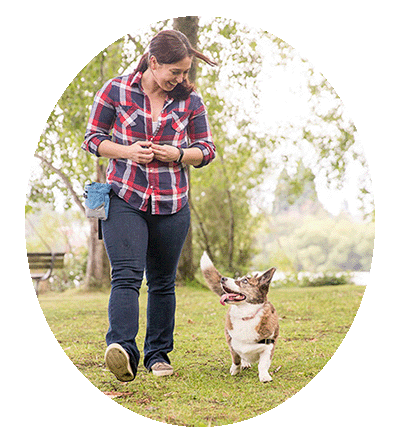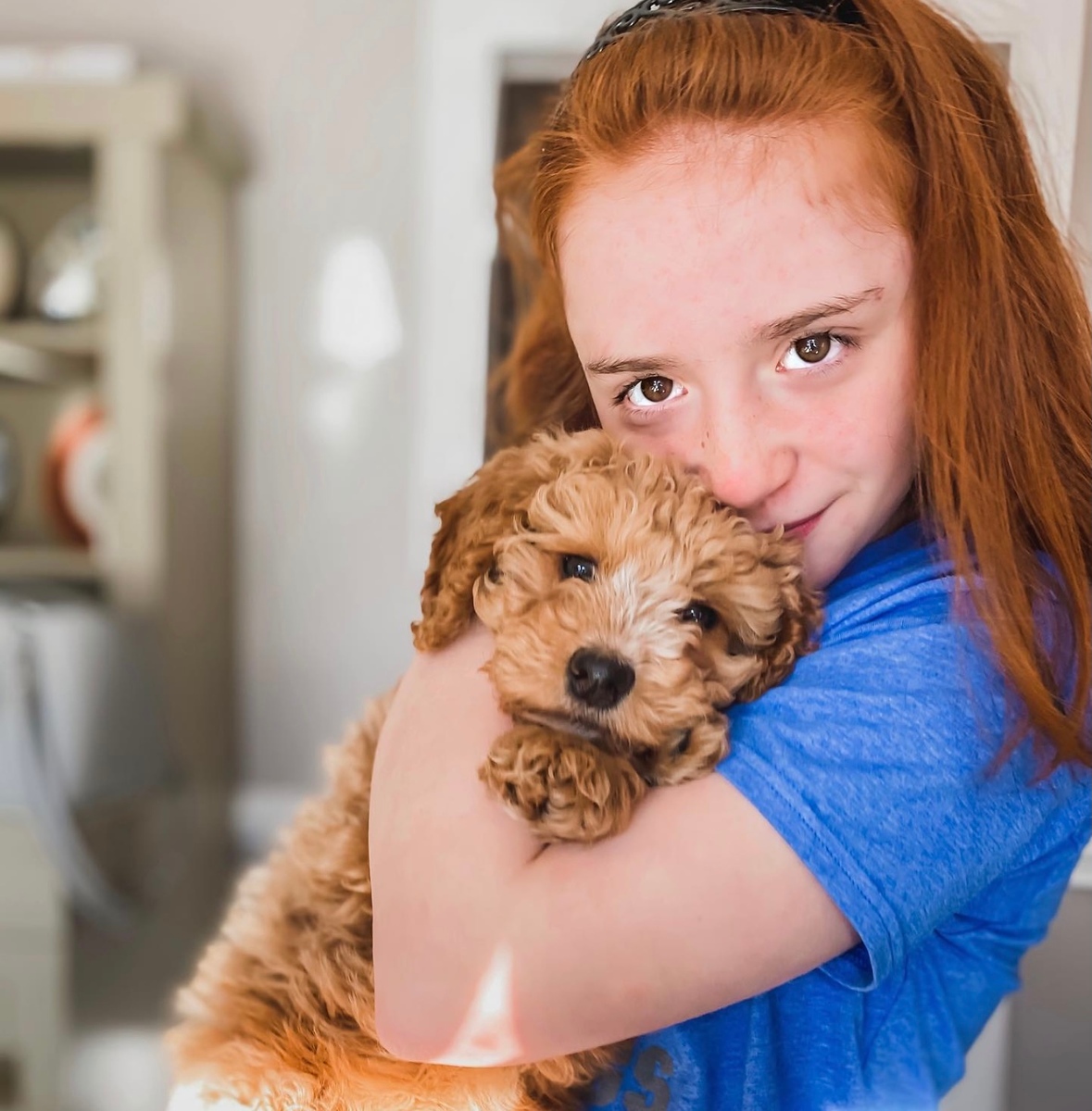As a breeder, I used to be a firm believer in formal puppy temperament testing. For years, I diligently conducted these assessments because that’s what I was told good breeders do. “Responsible breeders temperament test!” was repeated so often in breeding circles that I accepted it as the best practice without really digging into the science behind it.
If you’re reading this as a prospective puppy parent, you’ve probably seen this advice too—that you should look for breeders who temperament test. It makes sense on the surface, and I completely understand why families want as much information as possible when choosing their new family member.
Like many breeders, I thought these assessments could predict which puppy would be calm, which would be energetic, and which would be the perfect match for specific families. I was doing what I believed was best practice. But after years of experience, I wasn’t seeing the accuracy I expected from these tests, and after diving deep into the actual research, I made a decision: I stopped doing formal temperament testing entirely.
Here’s why, and why the science backs up this choice.
Quick Answer
Puppy temperament testing at 7 weeks is not reliable for predicting adult dog behavior. Multiple scientific studies show poor correlation between early puppy assessments and adult personality, with accuracy rates around 57%. Environment, training, and ongoing development have far greater impact on adult temperament than early testing.
What Is Puppy Temperament Testing?
Puppy temperament testing is a series of behavioral assessments typically performed on 7-week-old puppies to evaluate their responses to various stimuli, interactions, and situations. These tests aim to predict future personality traits and match puppies with appropriate families based on scored reactions to handling, sounds, movement, and social interactions.
Why Puppy Personality Tests Failed in My Breeding Experience
Puppy temperament testing sounds so logical. Test a 7-week-old puppy’s responses to various stimuli, score their reactions, and voilà: you can predict their adult personality and find the perfect puppy for your family. For years, this approach seemed like the responsible thing to do.
I first started questioning these tests when I noticed a troubling pattern: the results weren’t matching what I was seeing as these puppies grew into adults. Worse yet, when families received a puppy with expectations based on test results that didn’t match reality, it created disappointment.
One litter really drove this point home for me. We had a puppy who seemed much quieter and more laid-back compared to her boisterous siblings. When a family specifically wanted a calm, gentle dog, I recommended her based on what I was observing. Guess what happened when she got away from those overbearing brothers and sisters? She completely came out of her shell and became the life of the party! The family was convinced I’d given them the wrong puppy—but it was the same sweet girl, just finally free to show her true personality without the sibling dynamics. Lucky for everyone, it worked out perfectly because they absolutely adored her outgoing personality. But what if they hadn’t been flexible enough to embrace this surprise? That experience made me realize how risky it was to set specific expectations based on early observations.
That’s when I realized I needed to dig deeper. Maybe the problem wasn’t with how I was conducting the tests, but with the tests themselves. What I discovered in the research completely changed my approach to breeding and puppy placement.
Scientific Studies on Puppy Temperament Testing Accuracy
Long-term Research: Puppy Behavior Doesn’t Predict Adult Dog Temperament
A 2014 study of 98 Border Collies published in PLoS ONE followed dogs from just days old all the way to adulthood. Their conclusion was clear: the study found “poor predictability regarding future behaviour in pet dogs” and “a lack of correspondence between the behaviour of neonates and the same dogs during the puppy and adult test, implying a lack of validity of this tool for making predictions regarding future behaviour.”
Why Breed-Specific Tests Don’t Predict Individual Dog Personality
A 2016 longitudinal study looked at puppies at 7 weeks and again at 6 years. While researchers found that tests could identify breed traits, they concluded that “puppy temperament assessments predict puppy breed and AKC group, and do not predict adult temperament.” In other words, the tests might tell you a puppy is acting like a typical herding breed or sporting breed, but they won’t tell you what that individual dog will be like as an adult. For those of us breeding cross breeds like Goldendoodles, Cavapoos, and CavaDoodles, this finding is especially relevant: if tests can’t reliably predict individual behavior even within purebred lines, they’re even less meaningful when dealing with the genetic complexity of cross breeds.
How Puppy Brain Development Affects Temperament Testing
The research revealed some fascinating insights about how puppies actually develop:
- Tests Show Variability: Only about 57% of dog temperament studies report reliability measures, and researchers note that “there is still much work to be done on the standardization of methods.” This suggests that results can vary depending on who conducts them, when they’re conducted, and under what conditions.
- Environment Shapes Everything: Research by child psychologist Margaret Shunick beautifully demonstrated the power of environment. She worked with puppies that tests indicated would be “bossy” and “willful” adults, then gave half the families special guidance about positive training and structure.
The results were amazing: the puppies who received thoughtful training and clear boundaries developed into wonderful, well-behaved dogs, while those without guidance struggled more. This showed that what you do with your puppy matters so much more than any test score ever could. Learn more about aversive-free training methods that help puppies thrive.
Puppy Personality Changes: Why 7-Week Assessments Are Unreliable
Puppy Development Timeline: Why Testing at 7 Weeks Fails
- Birth to 3 weeks: Eyes and ears closed, basic reflexes only
- 3–7 weeks: Rapid brain development, basic socialization begins
- 7 weeks: Traditional testing age – brain still developing rapidly
- 8–12 weeks: Critical socialization period, major personality changes
- 3–6 months: Adolescent phase, significant behavioral shifts
- 6–18 months: Continued brain maturation, adult personality emerges
- 18+ months: Mature personality fully developed
Testing at 7 weeks is like predicting a teenager’s career based on their behavior as a toddler.
Professional trainers see this all the time: “Both good and bad experiences during the puppies first year of life have a major influence on what the adult version of that dog will be.” Testing at 7 weeks is like trying to predict what a flower will look like by examining the seed.
Many new puppy families face common challenges during this critical development period. Understanding the 3 main challenges puppy parents face can help you prepare for success from day one.
How Owner Anxiety Affects Puppy Behavior and Development
Here’s something temperament tests completely miss: how much our own emotions affect our puppies. Research confirms that dogs can sense our emotions through what they see, hear, and even smell, and they mirror those feelings right back to us (Frontiers in Psychology).
A 2014 study (Applied Animal Behaviour Science) showed that “the owner’s state of anxiety was contagious to their dog.” When humans experience stress or anxiety around their dogs, the dogs literally absorb those emotions and display corresponding behavioral changes.
The implications for breeders and families are profound. If we approach puppies with calm, confident energy during evaluations and daily interactions, we’re actively supporting their emotional development. Conversely, if we’re anxious or stressed, we may inadvertently create the very behavioral issues we’re trying to avoid.
I’ve experienced this firsthand. On days when I’ve been particularly stressed or on edge, I notice my dogs and puppies pick up on that energy immediately. When I’m calm and centered, they mirror that energy right back.
Better Alternatives to Puppy Temperament Testing for Breeders
By abandoning formal temperament testing, I can be more honest with families about what we actually know and don’t know about their puppy. I’m still happy to share observations about each puppy’s current personality—but I’m also clear that this is how they are with us in our environment, and they may show different sides of themselves once they’re home with their new family.
Temperament Testing vs. Science-Based Selection
|
Temperament Testing Approach |
Science-Based Approach |
|---|---|
|
Tests puppies at 7 weeks |
Observes ongoing development |
| Focuses on test scores | Emphasizes socialization quality |
| Predicts adult personality | Shares current observations honestly |
| Creates specific expectations | Prepares families for growth/change |
| One-time assessment | Continuous breeder support |
| 57% accuracy rate | Focus on controllable factors |
5 Signs a Breeder Uses Science-Based Practices Instead of Temperament Testing
- Focuses on early socialization experiences rather than test scores
- Emphasizes ongoing support and training resources
- Asks about your lifestyle and commitment to training
- Shares honest observations about current puppy behavior
- Discusses the importance of positive training methods
5 Key Research Findings About Temperament Testing
- Only 57% of studies show reliable results
- No correlation between 7-week and adult behavior
- Tests predict breed traits, not individual personalities
- Cross-breed predictions are even less accurate
- Environment trumps early testing
3 Things That Actually Predict Puppy Success
- Quality early socialization during 3–12 weeks
- Consistent, positive training approach
- Strong breeder support system
Frequently Asked Questions About Puppy Temperament Testing
Q: At what age should puppies be temperament tested?
A: Most temperament tests are conducted at 7 weeks, but research shows this timing doesn’t provide reliable predictions.
Q: What percentage of temperament tests are accurate?
A: Studies show only about 57% of dog temperament studies report reliable results.
Q: Do puppy personality tests work for any breeds?
A: Tests can identify breed traits but not individual personalities.
Q: Do temperament tests work better for designer breeds like Goldendoodles or Cavapoos?
A: They’re even less reliable for cross breeds.
Q: What’s better than temperament testing for choosing a puppy?
A: Focus on the breeder’s socialization practices, health testing, and ongoing support.
Q: Should I avoid breeders who don’t temperament test?
A: Absolutely not. Excellent breeders focus on proven factors like health and socialization.
Choosing the Right Puppy: Focus on Training, Not Testing
Puppy temperament testing may work well for some breeders and families, but it wasn’t the right fit for our program. What I’ve discovered is that focusing on what we can actually control creates a much stronger foundation for success.
Rather than trying to predict who a puppy will become, I’ve found it more rewarding to focus on giving each puppy the best possible start and then supporting families as their puppy’s unique personality unfolds.
Your puppy’s amazing personality isn’t determined by a test score at 7 weeks—it’s shaped by great genetics, loving early care, positive training, and the wonderful relationship you’ll build together.
Ready to find your perfect puppy match?
Our approach focuses on what truly matters: health, socialization, and supporting your family’s success. Apply for a puppy to learn more about our current litters and start your journey with a breeder who prioritizes science over speculation.



